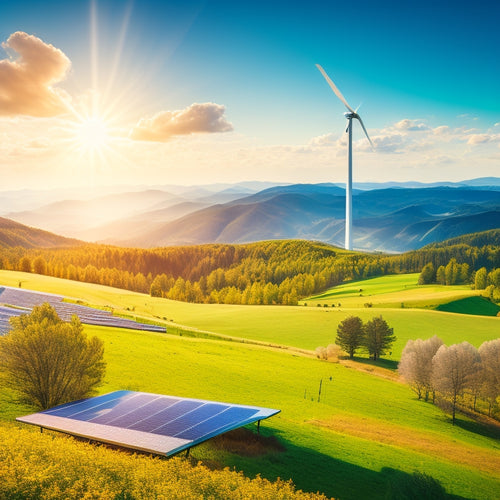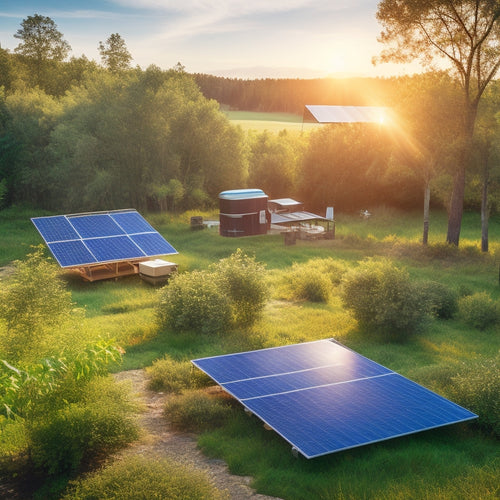
Roof Solar Installation
Share
You're considering a roof solar installation, which can greatly enhance your property value, cut your energy bills by up to 50%, and reduce your carbon footprint. This eco-friendly investment not only attracts environmentally conscious buyers but also increases your property's market appeal, potentially recouping installation costs. By understanding your daily energy usage patterns and optimizing your solar panel design, you can maximize your energy output and savings. As you investigate the technical aspects of solar energy systems, you'll find out how high-efficiency inverters, energy management, and optimized panel placement can further improve your solar experience, and there's more to reveal about how roof solar installation can change your energy environment.
The Essentials
- Roof solar installation can increase property value by up to 17% and attract eco-conscious buyers, enhancing market appeal.
- Solar panels can save homeowners up to 50% on energy bills, leading to substantial savings and financial freedom.
- Roof solar installation reduces carbon emissions, with potential savings of up to 50% on carbon output, promoting a cleaner environment.
- High-quality inverters with conversion efficiency rates above 95% ensure minimal energy loss during DC to AC power conversion.
- Optimized solar installation design and strategic panel placement enhance sunlight capture, maximizing roof space and energy output.
Boosts Property Value Instantly
By installing solar panels on your roof, you'll instantly enhance your property's market appeal and increase its selling price.
With solar panel installation for homes, you can showcase your commitment to renewable energy and attract eco-conscious buyers.
This upgrade will make your property stand out from neighboring homes, attracting potential buyers who value energy efficiency and sustainability.
As a result, you can expect to sell your property at a higher price, recouping your investment and then some.
Increased Market Appeal
As you consider investing in a roof solar installation, you'll reap a significant benefit: an increase in property value that's almost instantaneous. This increased market appeal stems from the aesthetic appeal of solar panels, which can enhance your home's exterior while showcasing your commitment to environmental benefits.
The community impact is also significant, as you'll be contributing to a cleaner, more sustainable environment for future generations. With energy independence, you'll be less reliant on the grid, which can be a major selling point for potential buyers.
By embracing green building solutions Renewable Energy Systems, you'll not only reduce your carbon footprint but also appeal to eco-conscious buyers. The installation process is streamlined, and maintenance requirements are minimal, ensuring that your solar panels will continue to generate energy for years to come.
Financing options and government incentives can help offset the initial cost, and local regulations often provide additional benefits. As technology advancements continue to improve efficiency and reduce costs, the appeal of solar energy will only continue to grow.
Higher Selling Price
Your decision to invest in a roof solar installation instantly enhances your property worth, resulting in a higher selling price. This is because solar panels are seen as a significant upgrade, making your home more attractive to potential buyers.
In fact, studies have shown that solar panels can increase your property worth by up to 17%. This means that if you decide to sell your home in the future, you can expect a higher selling price due to the added worth of your solar installation.
By adopting a sustainable energy solution like Renewable Energy Solutions, you not only reduce your carbon footprint but also contribute to a higher property worth.
Additionally, many residential incentives and solar financing options are available to help you offset the initial cost of installation. These incentives can include tax credits, rebates, and low-interest loans, making it more affordable for you to invest in solar energy.
Saves up to 50%
By installing roof solar panels, you'll start saving up to 50% on your energy bills, which translates to significant cost savings over time.
With efficient and durable solar panel solutions, you can maximize energy efficiency and reduce your reliance on traditional energy sources residential solar panels.
You'll also reduce your carbon footprint, contributing to a cleaner environment.
With lower energy bills and reduced carbon emissions, you'll reap the benefits of going solar while doing your part for the planet.
Lower Energy Bills
Installing roof solar panels can considerably reduce your energy bills, slashing them by up to 50% in some cases. This significant decrease in energy expenditure translates to substantial savings over time. You can enjoy this financial freedom by utilizing the power of the sun, allowing you to allocate your resources elsewhere.
By switching to solar energy, you'll be less reliant on the grid, achieving a level of energy independence that's both liberating and cost-effective. Additionally, you may be eligible for solar incentives, such as tax credits or rebates, which can further offset the initial installation costs.
With solar panels, you'll generate your own clean energy, reducing your reliance on traditional fossil fuels and the corresponding energy bills. As you reap the benefits of solar energy, you'll also be contributing to a more sustainable future.
Reduced Carbon Emissions
As you make use of the power of the sun through roof solar installation, you're not only saving on energy bills but also making a significant impact on the environment.
By tapping into renewable energy, you're reducing your reliance on fossil fuels, which are a major contributor to greenhouse gas emissions. This sustainable technology allows you to decrease your carbon footprint, contributing to a cleaner and healthier environment.
With roof solar installation, you can save up to 50% on carbon emissions. This is a substantial reduction, especially considering the alarming rate of climate change.
Inverter Converts DC Power
You'll need an inverter to convert the DC power generated by your solar panels into AC power, which is usable in your home. This conversion process is essential, as it enables you to efficiently feed energy back into the grid or power your appliances directly.
Additionally, a reliable solar panel battery backup guarantees that you have a steady supply of energy during outages and nights. The inverter's efficiency in converting DC to AC will greatly impact your overall energy output.
DC to AC Conversion
While solar panels generate DC power, your home's electrical system relies on AC power to function. This is where the inverter comes in - an essential component in your roof solar installation that converts DC power into usable AC power.
The inverter's primary function is to maximize solar panel efficiency by optimizing the DC power output. You'll want to confirm your inverter technology is high-quality to get the most out of your solar panel system.
Look for inverters with high conversion efficiency rates, typically above 95%. This means the inverter can convert almost all the DC power generated by your solar panels into usable AC power.
Advanced inverter technology also provides real-time monitoring and tracking of your system's performance, allowing you to identify any issues promptly. By selecting the right inverter, you'll be able to utilize the full potential of your solar panel system, providing you with the freedom to generate your own clean energy.
Efficient Energy Output
Converting DC power into AC power, the inverter guarantees your solar panel system produces efficient energy output. This conversion is essential, as it allows your solar panel system to generate usable electricity for your home or business.
With an efficient inverter, you can rest assured that the energy captured from the sun is being maximized.
You'll be pleased to know that modern inverters boast high solar panel efficiency, often above 95%. This means that only a small fraction of the energy is lost during the conversion process.
As you tap into renewable energy sources, you're not only reducing your carbon footprint but also gaining energy independence.
Assess Your Energy Consumption
You'll need to understand your daily energy usage patterns to determine how much power your solar installation should generate. This involves analyzing your energy consumption breakdown, including the amount of energy you use during peak hours and your overall daily energy needs.
Integrating a battery backup system, home energy management systems, can also help you optimize your energy usage and storage. By evaluating your energy consumption, you can accurately size your solar panel system to meet your specific energy requirements.
Daily Energy Usage Patterns
Your daily routine is filled with energy-hungry appliances, from the coffee maker that brews your morning coffee to the laptop that keeps you connected throughout the day.
These daily habits may seem trivial, but they contribute to your overall energy consumption. Understanding your daily energy usage patterns is essential in evaluating your energy consumption.
Take a closer look at your daily activities and identify areas where you can improve energy efficiency. For instance, do you leave your lights or TV on when not in use? Do you use energy-intensive appliances during peak hours?
Recognizing these patterns will help you identify opportunities to reduce your energy consumption. By making small changes to your daily habits, such as switching to energy-efficient light bulbs or turning off appliances when not in use, you can considerably reduce your energy consumption.
This newfound awareness will enable you to make informed decisions about your energy usage, ultimately giving you more control over your energy consumption and setting the stage for a successful roof solar installation.
Energy Consumption Breakdown
The household's energy usage profile is a complex web of interconnected systems, with various appliances and devices drawing power from the grid at different rates.
To optimize your energy consumption, you need to understand how each component contributes to your overall energy usage. You'll want to identify areas where energy efficiency can be improved, reducing your reliance on the grid and maximizing your potential solar incentives.
Start by breaking down your energy consumption into categories, such as lighting, heating, cooling, and appliances. This will give you a clear illustration of where your energy is being used.
You may be surprised to find that certain appliances or systems are consuming more energy than you anticipated. Look for opportunities to upgrade to energy-efficient alternatives, such as LED lighting or Energy Star-rated appliances.
Higher Energy Conversion Rate
When you opt for a roof solar installation with a higher energy conversion rate, you can expect increased power output from your solar panels.
This is because high-efficiency solar cells convert a larger percentage of sunlight into usable electricity, resulting in more kilowatt-hours per hour of sunlight.
With a higher energy conversion rate, you'll generate more power per unit area, making the most of your roof's available space.
Increased Power Output
Optimizing roof solar installation design enables higher energy conversion rates, resulting in increased power output. By doing so, you can maximize the amount of renewable energy captured from the sun, reducing your reliance on non-renewable sources. This is achieved through strategic placement and angling of solar panels to capture the most sunlight possible.
Additionally, using high-efficiency solar panels with advanced technology can further enhance your energy output. With increased power output, you'll enjoy lower energy bills and a reduced carbon footprint. Furthermore, you'll have the freedom to power your home or business with clean, sustainable energy.
Frequently Asked Questions
Can I Install Roof Solar Panels on My Own?
While you can technically handle an installation process on your own, it's essential you prioritize safety precautions to avoid electrical shock, falls, and other hazards - so, consider hiring a pro or take extensive training before diving in.
Will Roof Solar Panels Damage My Roof Structure?
As you build your dream castle, you wonder if the weight of progress will crush its foundation. Similarly, you're right to ask if solar panels will compromise your roof's integrity, adding hidden costs to the installation bill.
Are Roof Solar Panels Resistant to Extreme Weather?
You'll be relieved to know that solar panels are designed to withstand extreme weather conditions, boasting storm durability and heat resistance, ensuring they'll keep generating power even in the most intense weather scenarios.
Can I Expand My Solar Panel System in the Future?
Will you outgrow your current energy needs? You can easily expand your solar panel system in the future to meet increasing demands, simply by adding more panels to increase your solar panel capacity and satisfy your future energy needs.
Do Roof Solar Panels Require Regular Maintenance?
You'll want to perform regular checks to guarantee optimal energy harvesting, which involves inspecting for debris, using efficient cleaning techniques, and monitoring performance to identify potential issues, giving you peace of mind and maximum energy freedom.
Final Thoughts
By investing in a roof solar installation, you're not only enhancing your property value instantly, but also saving up to 50% on your energy bills. The inverter converts DC power into usable AC, and by evaluating your energy consumption, you can maximize your savings. With a higher energy conversion rate, you'll be producing clean energy in no time. So, what's holding you back from utilizing the power of the sun and securing a sustainable future?
Related Posts
-

Smart Home Thermostats to Revolutionize Your Space
Smart home thermostats revolutionize your space by providing precise temperature control and optimizing energy saving...
-

Renewable Energy Solutions to Reduce Your Carbon Footprint
To reduce your carbon footprint, adopting renewable energy solutions is key. Using solar panels or wind turbines can ...
-

Top Off Grid Solar Batteries for Renewable Energy
When seeking top off-grid solar batteries for renewable energy, consider options with advanced battery chemistry, suc...


